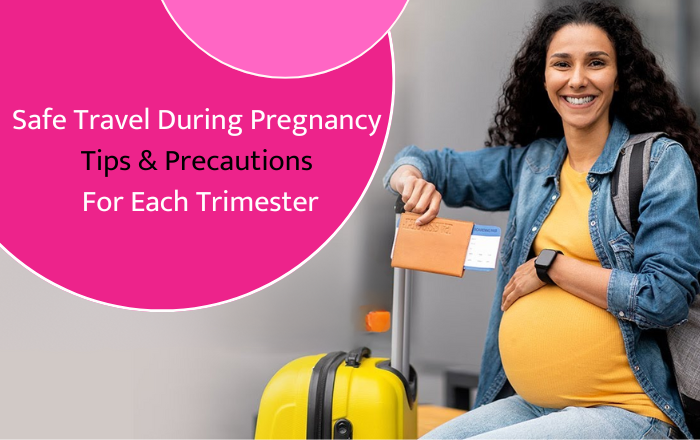Traveling while pregnant can feel like a challenge, but with the right planning, it can be a safe and enjoyable experience. Whether you’re heading to a nearby destination or taking a longer journey, understanding the right steps to take can help you stay comfortable and avoid any complications. In this article, we’ll walk you through important tips and precautions to keep in mind during each trimester of your pregnancy. We’ll also share valuable advice to ensure that your travels are safe and worry-free. Let’s explore how to travel smartly during pregnancy, whether it’s your first trimester or your last.
2. Why Is It Important to Plan Travel During Pregnancy?
Pregnancy brings many physical and emotional changes that can make travelling more difficult. Hormonal fluctuations, physical discomfort and fatigue can all affect how you feel while travelling. That’s why it’s important to plan ahead, understand your body’s needs and make adjustments to ensure your trip is safe.
It’s always a good idea to talk to your doctor before you go anywhere, especially if you’re planning to travel long distances. Being proactive can help you avoid unnecessary stress and reduce the risks associated with pregnancy-related changes.
3. Safe Travel Tips for the First Trimester (Weeks 1–12)
Physical and Emotional Considerations: The first trimester can be a challenging time due to symptoms like morning sickness, fatigue, and hormonal changes. If you’re traveling during this phase, consider taking shorter trips and avoid long flights or journeys that may worsen your symptoms. Make sure to listen to your body, take rest breaks often, and stay hydrated. Keep a few snacks with you in case nausea strikes, as food can sometimes help settle your stomach.
Precautions: Traveling during the first trimester may be uncomfortable, but with the right precautions, you can make it manageable. Avoid overexerting yourself. Opt for travel that isn’t too physically demanding, and try to avoid long hours of sitting. Breaks every couple of hours will help with circulation and comfort. Hydration is key, so always carry a water bottle.
Medical Advice: Before traveling, especially if it involves long-distance flights or trips, consult your doctor to make sure everything is progressing well with your pregnancy. Your doctor can advise you on whether any travel-related concerns should be addressed before you leave.
4. Safe Travel Tips for the Second Trimester (Weeks 13–26)
Ideal Time for Travel: The second trimester is often referred to as the “honeymoon phase” of pregnancy, as many women feel better during this time. Morning sickness usually subsides, and you may have more energy and less physical discomfort. This makes the second trimester an ideal time for traveling. The risk of miscarriage is lower, and many of the early pregnancy symptoms fade away.
Physical Well-Being: Even though you might feel better, it’s still important to take care of yourself. Choose comfortable clothing that won’t restrict your movement. If you’re flying, make sure to get up every couple of hours to stretch your legs and avoid swelling. Wearing compression stockings can also help with circulation, especially on long flights.
Precautions: While the second trimester is generally safer for travel, it’s still essential to have access to medical care wherever you’re going. Ensure your health insurance covers you in case of an emergency, and take along your medical records, including any relevant information about your pregnancy.
5. Safe Travel Tips for the Third Trimester (Weeks 27–40)
Challenges of Traveling Late in Pregnancy: As you approach the third trimester, travel becomes more difficult due to physical discomfort, fatigue, and the possibility of going into labor. Many airlines restrict travel for pregnant women after 36 weeks, and long trips might feel exhausting. Additionally, some medical issues such as swelling, back pain, and frequent bathroom trips may make it harder to enjoy long journeys.
Precautions to Take: If you must travel, stay close to home or opt for destinations with access to good medical facilities. Always check with your doctor before planning any long-distance trips, and carry a copy of your medical records. Some women may also want to have a backup plan in case they go into labor unexpectedly.
Travel Advice: Pack wisely for long trips. Make sure to bring items that will help you stay comfortable, such as a neck pillow, snacks, extra water, and any pregnancy-specific medications or supplements. Also, consider wearing loose, comfortable clothing to keep your blood circulation steady.
Read More Blogs – Hormonal Changes and Their Impact on Menstrual Timing
6. Common Travel Safety Concerns During Pregnancy
Pregnant women often wonder whether it is safe to travel by plane, car or other means of transport. Here are some common concerns:
1. Air travel: Airplanes are generally safe for pregnant women, but it’s important to check with your doctor. Avoid flying during the last month of pregnancy as you may be at risk of premature labour.
2. Car travel: On long car journeys, remember to take frequent breaks to stretch and move around. Make sure you wear your seatbelt, with the lap belt under your stomach.
3. Travelling by train or bus: These are also safe, but take care to avoid jerky movements and remember to stay hydrated.
4. Travel insurance: Make sure you are covered for emergencies, especially if you are travelling abroad.
7. Travel Packing List for Pregnant Women
Packing the right items for travel can make a huge difference in your comfort. Here’s a list of essentials:
- Comfort Items: A travel pillow, loose clothing, and comfortable shoes.
- Health Essentials: Medications, prenatal vitamins, and a first aid kit.
- Snacks and Drinks: Nutritious snacks like fruit, nuts, and granola bars, along with a water bottle.
- Documentation: Medical records, your doctor’s contact information, and any necessary prescriptions.
Emergency Supplies: A list of nearby hospitals or clinics at your destination.
When to Avoid Travel During Pregnancy
There are some instances when traveling during pregnancy should be avoided:
1. High-risk pregnancies: Conditions such as high blood pressure, gestational diabetes, or previous pregnancy complications may make travel unsafe.
2. Danger of preterm labor: If you’re at risk of premature labor, travel may not be advisable, especially in the final trimester.
3. Health concerns: If you’re experiencing severe morning sickness, extreme fatigue, or other medical issues, it may be better to stay home.
Dr. Manisha Kulkarni – Pregnancy Specialist in Hadapsar
For any concerns or questions about safe travel during pregnancy, Dr. Manisha Kulkarni, a pregnancy specialist in Hadapsar, is here to help. With years of experience in antenatal care, she will provide you with professional advice tailored to your needs, ensuring your comfort and safety throughout your journey. Whether you’re planning a short trip or a long vacation, consulting Dr. Kulkarni will give you the peace of mind you need. Contact her today to arrange a consultation.
FAQ
1. How far can I travel during my third trimester? Traveling long distances during the third trimester is not recommended, as you may go into labor unexpectedly. Always check with your doctor before planning any travel in the final weeks.
2. Can I travel in my first trimester if I have morning sickness? If you’re experiencing morning sickness, you might want to limit travel during the first trimester. However, with the right preparations, such as packing snacks and medications, it can still be manageable.
3. How should I prepare for an emergency while traveling during pregnancy? Make sure to have emergency contacts, a list of nearby hospitals, and all necessary medical documents with you. It’s also wise to discuss potential emergencies with your doctor before you travel.


